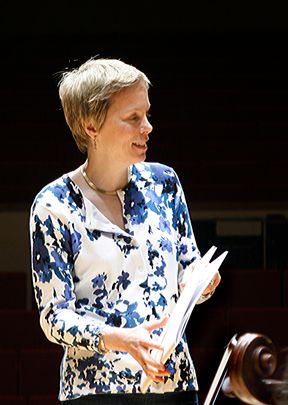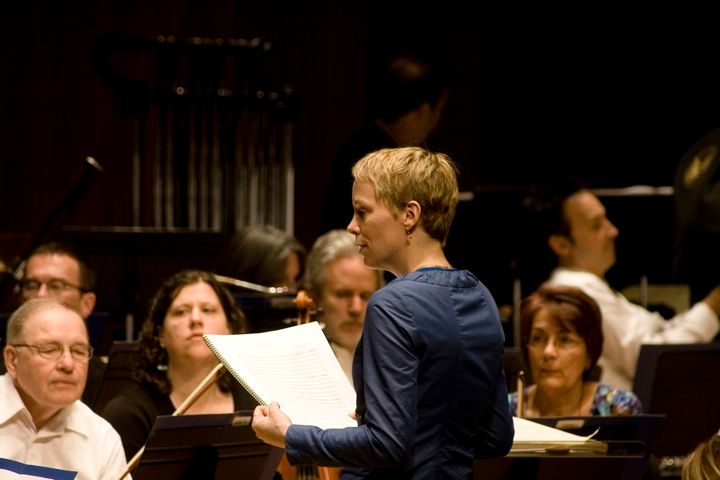The German psychologist Kurt Koffka famously summarized Gestalt theory with the phrase, "the whole is other than the sum of its parts." Koffka emphasized that in Gestalt psychology, the whole has an existence which is unique, independent of its component elements. While we can recognize the various parts of, say, the sound of a bell (quick attack, long sustain, inharmonic timbre), our experience of the whole bell sound is entirely separate from our awareness of its individual features. The whole is other than the sum of its parts.
 |
| Augusta Read Thomas at Jib 2010 |
This concept is key to Augusta Read Thomas's music, because throughout her oeuvre, the composer is attempting—and succeeding—at something impossibly contradictory: a music which is at once intricately crafted with meticulous precision, but which sounds spontaneous and improvisational. Thomas's music is incredibly detailed, constructed from a keen awareness of instrumental technique, tonal and timbral nuance, and a harmonic sophistication matched by only a small handful of contemporaries. These are the "parts" of her music, manifested through explicit notation and attention to detail. "One of the things that interests me a great deal is for the music to be very nuanced. So the notations are extremely specific, and I think that lends itself to a clear and crisp execution of the piece," Thomas says in an interview with New Music Box. "Yet on the other hand, I want the pieces to sound really spontaneous—'There it goes! The orchestra’s playing, and the train has left the station!' [It] almost sounds as if they’re improvising." Herein lies the contradictory "whole" of Thomas's music—the effect of unplanned animation, whimsical energy, vibrant organicism. While a listener may be aware of the careful, deliberate construction of Thomas's music, the experience is one of flowing caprice, a music of sudden shifts that are both unexpected and inevitable. The whole is other than the sum of its parts.
Few composers have managed to successfully achieve this tightrope-walk of carefully-composed spontaneity. Debussy comes to mind, and Thomas's music certainly maintains a Debussian finesse, heard in the intricate diaphanousness of 2010's Jubilee for orchestra or the refined lyricism of 2005's violin concerto, Carillon Sky. But her music also often features a ferocious dynamism, as colors and shapes collide with one another with a forcefulness that calls to mind Varèse's sinewy harmonic intersections (see for example, her early orchestral piece, Words of the Sea). Throughout her work, however, remains this ("Koffka-esque"?) distinction between whole and part that the composer herself is well aware of: "If I could try to describe the way I think of music, I would draw a big circle. Then inside of it, I would put a lot of words, such as counterpoint, harmony, rhythm, harmonic rhythm, pitch, flow, flux, density, tessitura, balance, and so on and so forth. For me, it’s a big huge gestalt. […] They’re all connected with this beautiful web, and so while I could talk about rhythm independently, or I could talk about harmony independently, for me, they instantly plug back into that gestalt."
Augusta Read Thomas is one of the hardest working composers active today. Just this year, she has already had four pieces premiered (including Selene, premiered last month by friends of the Center JACK Quartet and Third Coast Percussion, and the orchestral ballet EOS: Goddess of the Dawn premiered by the Utah Symphony in February) with two more upcoming this month (including the Parker Quartet's premiere of Helix Spirals next week at Harvard). She spends eight to ten hours a day composing—an activity she typically does on her feet, standing at large draft tables, as she describes in the video below. Her prolific work schedule has resulted in an impressively expansive catalog of works, and has made Thomas one of the most frequently-performed living composers. She has been recognized by both the American Academy of Arts and Letters (inducted in 2009) and the American Academy of Arts and Sciences (inducted in 2012), and, most recently, she won the Lancaster Symphony Orchestra's Composer Award for 2015-16, the oldest award of its kind in the nation (previous winners have included William Schuman, Walter Piston, and Morton Gould). It would be entirely forgivable if such an active composer had no time or interest in teaching, but Thomas is very passionate about teaching, an activity she sees as a "natural extension of [her] creative process." She currently teaches at the University of Chicago, where she is one of seven University Professors, and regularly teaches at the Tanglewood Music Center during the summer. Next year, she will be spearheading the Ear Taxi Festival, which celebrates Chicago's strong new music scene.
We are thrilled that Augusta Read Thomas will be joining us during this anniversary year at June in Buffalo. The composer has been an invaluable member of the JiB faculty over the years, regularly presenting new and exciting works, and providing sharp insights and guidance to young composers. Perhaps the most affecting aspect of Thomas's relationship with the festival is that she was once herself one of those emerging composers who came through the festival as a student, before returning years later as a member of the faculty. "I first came to June in Buffalo in 1988, while I was a student of Jacob Druckman at Yale. I had a great time. It was enriching in terms of learning the music of others, hearing beautiful concerts, and having lots of time for informal discussions about music. I loved it! I went back at least once more as a student in the early 1990s."
Thomas has high praise for the festival, pointing out how beneficial it's been to so many emerging composers over the years: "I think the festival has boosted the careers of lots of students—and there have been many over the years (30 years times 25-30 students each year). It's really been something that's helped a lot of composers, even if it's just one recording or one connection made—a composer can meet someone they'll know as a colleague for the rest of their career. There are all kinds of things like that which are difficult to put a finger on, but which are part of the culture of the festival."
Thomas has high praise for the festival, pointing out how beneficial it's been to so many emerging composers over the years: "I think the festival has boosted the careers of lots of students—and there have been many over the years (30 years times 25-30 students each year). It's really been something that's helped a lot of composers, even if it's just one recording or one connection made—a composer can meet someone they'll know as a colleague for the rest of their career. There are all kinds of things like that which are difficult to put a finger on, but which are part of the culture of the festival."
 |
Augusta Read Thomas rehearses Aureole with
the Buffalo Philharmonic Orchestra at JiB 2013 |
This year, we can look forward to two pieces which will be played on the June 5th Performance Institute concert: 1999's Passion Prayers for solo 'cello and six instruments, and 2007's Scat for chamber ensemble, both conducted by Daniel Bassin. We're thrilled that Augusta Read Thomas will once again bring her work, insight, passion, and musicality to the festival, demonstrating both the parts and the whole of her craft to emerging composers and audiences alike.
—Ethan Hayden



